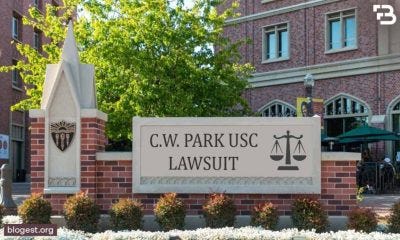C.W. Park USC Lawsuit Update: Latest Developments and Impact

Introduction to the c.w. park usc lawsuit
W. Park USC Lawsuit
The c.w. park usc lawsuit has captured headlines and ignited conversations across the country. With its roots in serious allegations, this case has raised critical questions about accountability at one of America’s most prestigious universities. As new developments unfold, students, faculty, and concerned citizens are eager to understand what it all means for the University of Southern California and the broader higher education landscape. Buckle up as we dive into the latest updates on this pivotal legal battle and explore its far-reaching implications!
Background and Timeline of Events
The C.W. Park USC lawsuit emerged from a series of troubling allegations that rocked the University of Southern California. It all began in 2021 when concerns about academic integrity and racial discrimination surfaced within the institution.
As details unfolded, they painted a picture of systemic issues affecting students’ experiences. The claims sparked significant media attention, leading to increased scrutiny surrounding USC’s practices.
Over time, key documents were released, revealing deeper layers to the situation. This prompted both internal investigations and public outcry for accountability.
By mid-2022, various stakeholders had joined forces, bringing their voices forward in support of change at USC. With each new revelation came renewed conversations about fairness and equity on campus.
The timeline continued to evolve as court dates approached and discussions intensified over how best to address these pressing matters head-on.
Key Players Involved in the Lawsuit
The C.W. Park USC lawsuit involves several key players, each bringing unique perspectives and stakes to the table.
C.W. Park himself is at the center of this case, representing a significant voice advocating for change within higher education. His experiences have highlighted systemic issues that resonate with many.
USC administrators are also crucial figures in this narrative. Their decisions and policies directly influence how the university responds to allegations and public scrutiny.
Legal teams on both sides play pivotal roles too. They shape arguments, strategize defenses, and navigate the complexities of law surrounding academic institutions.
Students and faculty members contribute their voices through support or critique in response to developments. Their insights reflect broader concerns regarding ethics in academia and accountability within educational settings.
Latest Developments in the Case
Recent updates in the C.W. Park USC lawsuit reveal significant shifts in both strategy and focus. Legal teams representing Park have intensified their efforts, seeking to gather more evidence that could strengthen their position.
New documents surfaced, revealing internal communications within USC that may shed light on procedural missteps. This has raised questions about the university’s handling of similar cases in the past.
Moreover, depositions from key witnesses are scheduled for next month. These testimonies could provide critical insights into the culture at USC during the time of the allegations.
On another front, discussions around potential settlement options have emerged. Both parties appear open to negotiations as they weigh pros and cons of continuing a lengthy trial process.
As these developments unfold, legal experts are closely monitoring how they might shape public perception and influence future actions by higher education institutions nationwide.
Potential Impact on USC and Higher Education Institutions
The C.W. Park USC lawsuit could resonate far beyond the university’s campus. It has sparked conversations around accountability and transparency in higher education.
As more institutions become aware of this case, they may review their policies. The goal? To prevent similar lawsuits from arising in the future. Universities might adopt stricter guidelines to ensure compliance with ethical standards.
This lawsuit also raises concerns about student safety and mental health resources across campuses nationwide. Educational institutions may feel pressure to invest more in support systems for students facing challenges.
Moreover, donors and alumni could reconsider their contributions if they perceive a lack of integrity within an institution. This financial aspect can significantly influence how universities prioritize reforms moving forward.
The implications stretch into recruitment strategies as well, affecting how universities present themselves to prospective students and families seeking safe academic environments.
Lessons Learned and Reforms Made Since the Lawsuit
The C.W. Park USC lawsuit has sparked significant reflection within the university’s administration. One major lesson learned is the importance of transparency in handling complaints and allegations.
USC has since revamped its policies to ensure that all claims are treated with utmost seriousness and urgency. This involves establishing clearer communication channels for students to voice concerns without fear of retaliation.
Additionally, training programs have been implemented for staff and faculty on recognizing issues related to misconduct or discrimination. Awareness initiatives aim to foster a more inclusive environment across campus.
Furthermore, feedback mechanisms have been enhanced. This allows students and employees alike to offer insights into policy effectiveness, ensuring ongoing improvements based on real experiences within the community.
Such reforms not only address past shortcomings but also pave the way for a safer, more accountable educational atmosphere at USC moving forward.
Conclusion: What’s Next for C.
W. Park and USC?
The C.W. Park USC lawsuit continues to unfold, capturing attention not only within the university community but across higher education institutions nationwide. As updates emerge, both sides are poised for what could be a pivotal resolution.
As this case progresses, it will likely shape policies and practices at USC and beyond. Stakeholders are watching closely, recognizing that the outcome could set precedents affecting how universities handle similar issues in the future.
C.W. Park’s journey is far from over. The ramifications of this case will resonate long after legal proceedings reach their conclusion. Both Park and USC face an uncertain path ahead as they navigate these complex challenges together.
With ongoing developments expected in the coming months, everyone involved remains on alert for what lies ahead in this significant legal battle.




